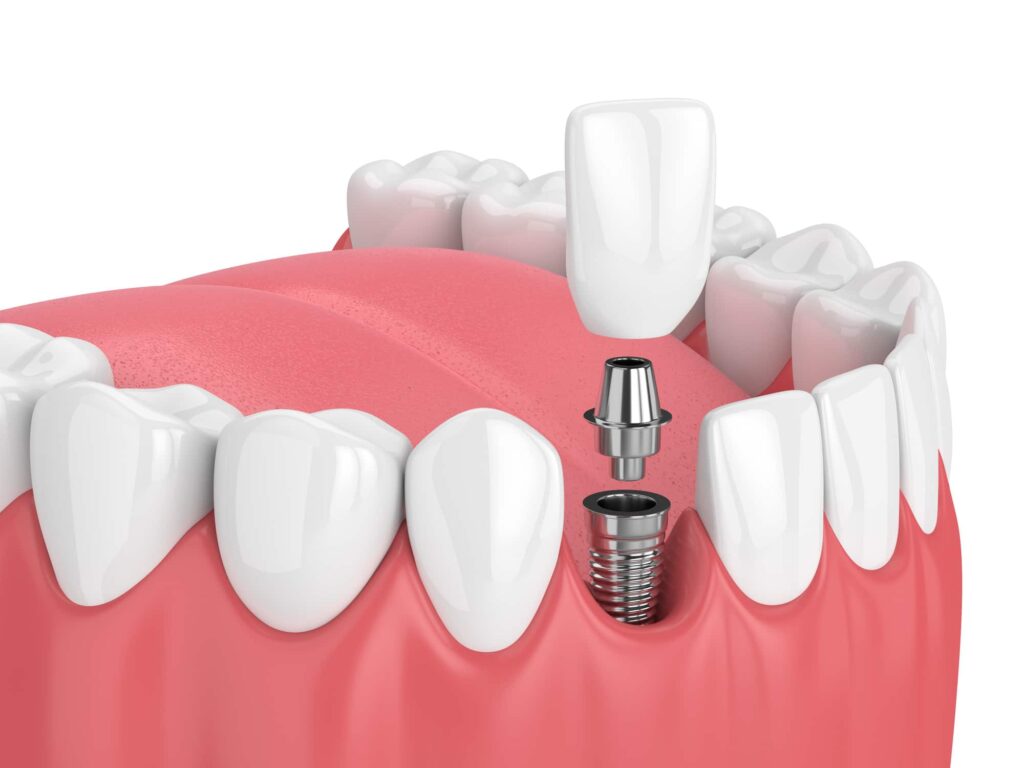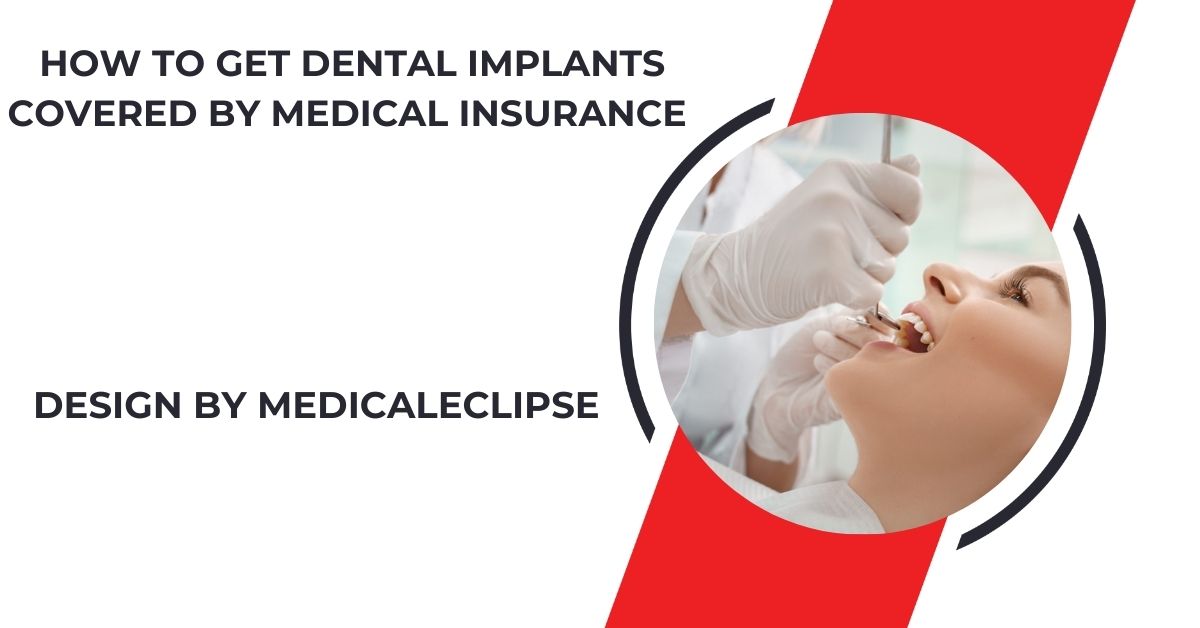To get dental implants covered by medical insurance, prove medical necessity with proper documentation and follow the claims process.
This guide will help you navigate the complexities of insurance coverage for dental implants and provide actionable steps to improve your chances of getting your procedure funded.
Understanding Dental Implants and Their Costs:

Before delving into insurance coverage, it’s essential to understand what dental implants are and their associated costs. A dental implant is a titanium post surgically placed into the jawbone, acting as a root for a replacement tooth.
The process typically involves multiple stages, including:
- Initial Consultation: Your dentist will assess your oral health and determine if you’re a good candidate for implants. This may involve X-rays or 3D imaging.
- Implant Placement: The titanium post is surgically implanted into the jawbone, requiring a healing period of several months for osseointegration, where the bone fuses with the implant.
- Abutment Placement: After healing, an abutment (connector piece) is attached to the implant, providing a base for the crown.
- Crown Placement: Finally, a custom-made crown is placed on the abutment to complete the restoration.
The total cost of dental implants can vary widely based on several factors, including:
- Location: Prices can differ significantly depending on where you live. Urban areas often have higher costs due to increased overhead for dental practices.
- Number of Implants: The more implants you need, the higher the cost. A single implant can range from $3,000 to $4,500, while multiple implants can exponentially increase the total.
- Type of Implant: Different materials and techniques can affect the price. For example, zirconia implants may be more expensive than titanium ones.
- Additional Procedures: Bone grafts or sinus lifts may be necessary, increasing costs. These procedures can range from a few hundred to several thousand dollars depending on complexity.
On average, a single dental implant can range from $3,000 to $4,500, and a full mouth restoration can cost upwards of $30,000. Given these costs, understanding how to get dental implants covered by medical insurance is crucial.
Also Read: How to Avoid Medicaid 5 Year Lookback – Tips for Smart Planning!
Differentiating Between Dental and Medical Insurance:
The first step in securing coverage is recognizing the difference between dental and medical insurance. Most dental plans focus on preventive care and basic procedures, while medical insurance covers health-related issues.
However, there are circumstances where dental implants may be considered a medical necessity, making them eligible for coverage under your medical insurance plan.
Key Differences:
- Dental Insurance: Typically covers routine dental care like cleanings, fillings, and extractions. Some plans may cover part of the cost for implants, but often only under specific circumstances or with waiting periods.
- Medical Insurance: Designed to cover a broader range of health-related expenses. In some cases, procedures that involve the jawbone or reconstructive surgery after an injury may qualify for coverage.
Key Scenarios for Medical Coverage of Dental Implants:
Certain conditions may qualify dental implants for medical insurance coverage:
Accident or Injury:
If you lost teeth due to an accident or injury, your medical insurance may cover the costs associated with dental implants as part of reconstructive surgery. In such cases, documentation from the accident report and medical records will be essential.
Medical Conditions:

Some medical conditions, such as cancer or diabetes, can lead to tooth loss. If your tooth loss is related to a medical condition, you may be able to claim implants as part of treatment. Conditions that affect bone density or oral health, like osteoporosis, may also strengthen your case for medical coverage.
Jawbone Deterioration:
If you have experienced significant bone loss that affects your overall health, medical insurance might cover the implant surgery as a necessary procedure to restore functionality. A medical professional may need to document how the lack of teeth impacts your ability to eat, speak, or maintain overall health.
Steps to Get Dental Implants Covered by Medical Insurance:
To maximize your chances of getting dental implants covered, follow these steps:
Review Your Policy:
Start by reviewing your medical insurance policy. Look for sections that detail coverage for oral and maxillofacial surgery. Some policies may explicitly include coverage for dental implants under specific circumstances. Pay special attention to terms like “oral surgery,” “reconstructive surgery,” or “maxillofacial procedures.”
Get a Comprehensive Diagnosis:
Schedule an appointment with your dentist to discuss your situation. They will conduct a thorough examination and provide documentation that outlines the necessity of dental implants. This may include:
- X-rays: To assess bone density and structure.
- Photographs: Documenting your dental condition.
- Detailed Treatment Plan: Outlining the steps necessary to restore your oral health.
Also Read: What Is a Acute Medical Unit – Quick Guide !
Obtain a Referral:
If your dental implants are related to a medical condition or injury, ask your dentist for a referral to a specialist. A medical doctor, such as an oral surgeon or periodontist, can help establish a clear medical need for the procedure, which can be crucial for insurance claims. The specialist’s report should explicitly state how dental implants are essential for your health and well-being.
Document Everything:
Keep meticulous records of all medical documentation, including:
- Treatment Plans: Detailed descriptions from your dentist about why implants are necessary.
- Medical History: Evidence linking your tooth loss to a medical condition or injury. This may include letters from healthcare providers that explain the medical necessity of the procedure.
- Cost Estimates: Obtain a cost breakdown from your dentist or oral surgeon to help the insurance company understand the financial aspect.
File a Claim:
Once you have all necessary documentation, file a claim with your insurance company. Be sure to include:
- Claim Form: Complete the insurance claim form accurately, ensuring all information is correct and matches your policy details.
- Supporting Documents: Attach your diagnosis, treatment plan, and any other relevant information, including photographs or imaging results.
- Follow-Up: After submitting your claim, follow up with the insurance company to ensure it’s being processed. Ask for a timeline on when you can expect a decision.
Appeal if Necessary:

If your initial claim is denied, don’t lose hope. Review the denial letter carefully to understand the reasons behind it. Common reasons for denial may include:
- Lack of medical necessity.
- The procedure being deemed “experimental.”
- Insufficient documentation.
You can appeal the decision by providing additional documentation or clarification regarding the medical necessity of your dental implants. Ensure your appeal is submitted within the timeframe specified by your insurer.
Additional Options for Coverage:
If your medical insurance does not cover dental implants, consider these alternatives:
- Flexible Spending Accounts (FSA) or Health Savings Accounts (HSA): If you have these accounts, you can use pre-tax dollars to pay for dental implants. This can make the procedure more affordable, as you are essentially using your own money tax-free.
- Payment Plans: Many dental offices offer financing options to help spread the cost over time, making implants more affordable. Look for practices that partner with financing companies that specialize in dental procedures, allowing you to make manageable monthly payments.
- Dental Discount Plans: These plans provide reduced rates for dental procedures, including implants, and can be a good alternative if insurance coverage is lacking. These are not insurance but can significantly lower out-of-pocket costs for procedures.
FAQ’s
1. Can medical insurance cover dental implants?
Yes, if dental implants are deemed medically necessary, such as after an injury or due to a medical condition like bone loss or cancer, medical insurance may cover them.
2. What are common reasons for insurance to cover dental implants?
Medical insurance may cover implants if the tooth loss results from an accident, illness, or jawbone deterioration affecting health.
3. How do I improve my chances of getting coverage for dental implants?
Gather thorough documentation, including X-rays, a treatment plan, and medical records, and file a claim with detailed support showing medical necessity.
4. What should I do if my claim for dental implants is denied?
You can appeal the denial by providing additional documentation, such as a doctor’s report that strengthens the argument for medical necessity.
5. What alternatives exist if medical insurance doesn’t cover dental implants?
You can use FSAs, HSAs, payment plans, or dental discount plans to help offset the cost of implants if insurance doesn’t cover them.
Conclusion
Getting dental implants covered by medical insurance is challenging but possible. Understand your insurance policy, document medical necessity, and follow the claims process to improve your chances. If coverage falls short, explore alternative payment options like FSAs, HSAs, or financing plans. With persistence and the right approach, you can achieve the smile you deserve without overspending.

Leave a Reply